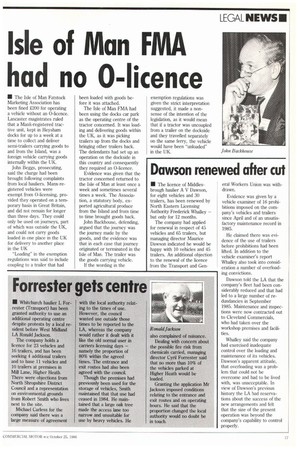Isle of Man FMA had no 0-licence
Page 19

If you've noticed an error in this article please click here to report it so we can fix it.
• The Isle of Man Fatstock Marketing Association has been fined £200 for operating a vehicle without an 0-licence. Lancaster magistrates ruled that a Mara-registered tractive unit, kept in Heysham docks for up to a week at a time to collect and deliver semi-trailers carrying goods to and from the Island, was a foreign vehicle carrying goods internally within the UK.
John Beggs, prosecuting, said the charge had been brought following complaints from local hauliers. Manx-registered vehicles were exempt from 0-licensing, provided they operated on a temporary basis in Great Britain, and did not remain for longer than three days. They could only be used on journeys, part of which was outside the UK, and could not carry goods loaded in one place in the UK for delivery to another place in the UK "Loading" in the exemption regulations was said to include coupling to a trailer that had been loaded with goods before it was attached.
The Isle of Man FMA had been using the docks car park as the operating centre of the tractor concerned. It was loading and delivering goods within the UK, as it was picking trailers up from the docks and bringing other trailers back. The defendants had set up an operation on the dockside in this country and consequently they required an 0-licence.
Evidence was given that the tractor concerned returned to the Isle of Man at least once a week and sometimes several times a week. The Association, a statutory body, exported agricultural produce from the Island and from time to time brought goods back.
John Backhouse, defending, argued that the journey was the journey made by the goods, and the evidence was that in each case that journey originated or terminated in the Isle of Man. The trailer was the goods carrying vehicle.
If the wording in the exemption regulations was given the strict interpretation suggested, it made a nonsense of the intention of the legislation, as it would mean that if a tractor was uncoupled from a trailer on the dockside and they travelled separately on the same ferry, the vehicle would have been "unloaded" in the UK.




































































































































